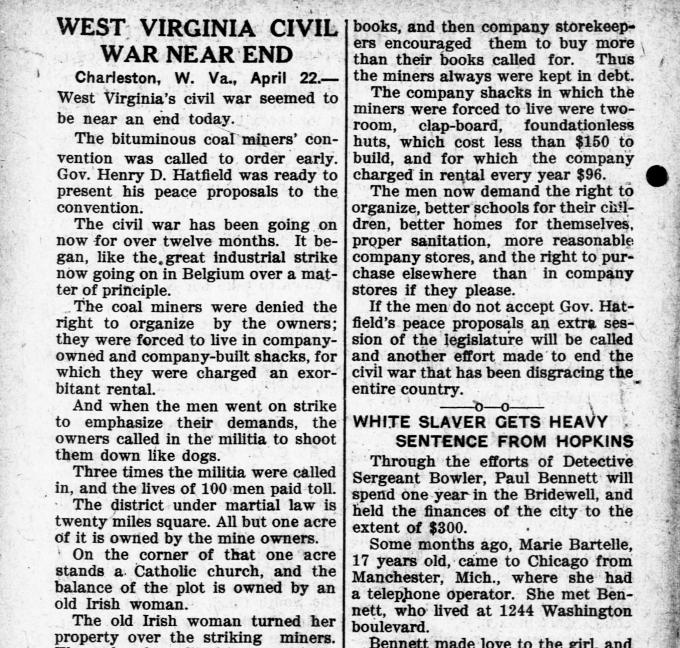|
Moderated by NW Okie! |
Volume 17 , Issue 152015Weekly eZine: (374 subscribers)Subscribe | Unsubscribe Using Desktop... |
April, 1913 - West Virginia Civil War Near End

It was in The Day Book, out of Chicago, Illinois, that we find this story about "West Virginia Civil War Near End." It wasn't about the war of 1864 between the North and South. It was about the coal miners being denied the right to organize by the owners.
Charleston, W. Va., April 22 (1915) -- The bituminous coal miners' convention was called to order early. Gov. Henry D. Hatfield was ready to present his peace proposals to the convention.
The civil was had been going on for over twelve months. It began, like the great industrial strike then going on in Belgium over a matter of principle.
The coal miners were denied the right to organize by the owners; they were forced to live in company owned and company built shacks, for which they were charged an exorbitant rental.
And when the men went on strike to emphasize their demands, the owners called in the militia to shoot them down like dogs. Three times the militia were called in, and the lives of 100 men paid toll.
The district under martial law was twenty miles square. All but one acre of it was owned by the mine owners. On the corner of that one acre stood a Catholic church, and the balance of the plot was owned by an old Irish woman.
The old Irish woman turned her property over the striking miners. There they had lived in tents pitched so close together that the sanitary conditions had been unspeakable since the war began.
But that Irish acre was the only ground in the district from which the mine owners could not order the miners away and had them shot down if they did not move away.
Before the strike began the miners were forced to buy their tools, their food, their clothing, their furniture, their tobacco and everything from company stores.
The women never handled money. The company gave them coupon books, and then company storekeepers encouraged them to buy more than their books called for. Thus the miners always were kept in debt.
The company shacks in which the miners were forced to live were two room, clap-board, foundations huts, which cost less than $150 to build, and for which the company charged in mental every year $96.
The men were demanding the right to organize, better schools for their children, better homes for themselves, proper sanitation, more reasonable company stores, and the right to purchase elsewhere than in company stores if they please.
If the men do not accept Gov. Hatfield's peace proposals an extra session of the legislature would be called and another effort made to end the civil war that had been disgracing the entire country.
| View or Add Comments (0 Comments)
| Receive
updates ( subscribers) |
Unsubscribe
| © . Linda Mcgill Wagner - began © 1999 Contact Me | |
